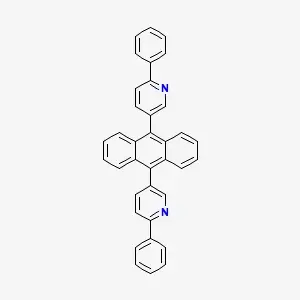DPPyA / 30g
Safety Information
Hazard Statements
Precautionary Statements
Pictograms
Properties
| Signal Word | Warning |
Product Description
DPPyA, or 9,10-Bis(6-phenylpyridin-3-yl)anthracene, is a specially formulated organic compound highlighted for its fluorescent properties. It incorporates an anthracene core flanked by two 6-phenylpyridine units, a configuration that enhances its solubility in common organic solvents and thermal stability. This compound is particularly useful in optoelectronic applications, such as organic light-emitting diodes (OLEDs) and organic photovoltaics (OPVs), where its fluorescent characteristics can contribute to the development of materials with tailored electronic and optical properties. The presence of phenylpyridine units also introduces a balance of electron-donating and electron-withdrawing groups, which can influence charge transport and recombination processes in optoelectronic devices. Furthermore, DPPyA's structure allows for its use in the synthesis of conjugated polymers, offering opportunities for the creation of advanced materials with enhanced performance in electronic and photonic applications.
Application
In practical applications, DPPyA is employed in the construction of optoelectronic devices, including OLEDs and OPVs, where its fluorescent properties can enhance the visual appeal and efficiency of displays. The compound's thermal stability ensures its reliability during the manufacturing process and throughout the operational lifetime of the devices, contributing to their durability and longevity. Additionally, DPPyA's solubility supports the formation of thin films that can be deposited onto various substrates, facilitating the fabrication of complex device architectures. Beyond optoelectronics, the compound's properties may also find applications in the development of sensors and other electronic components, where its fluorescent characteristics can be leveraged for specific detection or signaling purposes.
Articles:
- Achieving Pure Green Electroluminescence with CIEy of 0.69 and EQE of 28.2% from an Aza-Fused Multi-Resonance Emitter
Publication Date: 02 July 2020
Yuewei Zhang, Dr. Dongdong Zhang, Jinbei Wei, Xiangchen Hong, Yang Lu, Deping Hu, Guomeng Li, Ziyang Liu, Yang Chen, Prof. Lian Duan
https://doi.org/10.1002/ange.202008264
- Approaching Nearly 40% External Quantum Efficiency in Organic Light Emitting Diodes Utilizing a Green Thermally Activated Delayed Fluorescence Emitter with an Extended Linear Donor–Acceptor–Donor Structure
Publication Date: 13 September 2021
Yang Chen, Dongdong Zhang, Yuewei Zhang, Xuan Zeng, Tianyu Huang, Ziyang Liu, Guomeng Li, Lian Duan
https://doi.org/10.1002/adma.202103293
- Understanding and Manipulating the Interplay of Wide-Energy-Gap Host and TADF Sensitizer in High-Performance Fluorescence OLEDs
Publication Date: 02 July 2019
Xiaozeng Song, Dongdong Zhang, Yang Lu, Chen Yin, Lian Duan
